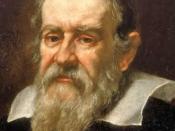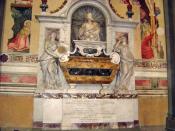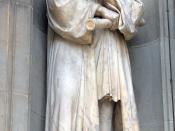Galileo Galilei
Galileo Galilei, an Italian astronomer and physicist (February 15, 1564-January 8, 1642), has been called the founder of modern experimental science. If it were not for his persistent questioning regarding the concept of the Ptolemaic geocentric universe, his refinement of the telescope that he used to confirm his theory of a heliocentric universe, and his discovery of the law of the falling bodies, the way people think and see astronomy or even the way we think about science as, would have had many major differences than how we actually see them today.
In the law of falling bodies, as perceived by the Aristotelian eyes, "the rate of the fall of the body is proportional to its weight". This means that the heavier an object is the faster it falls. This law was created by no one other than Aristotle himself. This law was thoroughly refined by Galileo Galiei. Galileo's use of mathematics and experimentation for physical research were one of the central innovations of his scientific activity. Galileo was deeply influenced by Archimedes principles of statics which he expanded on for his discussion of moving bodies. This law states that a freely falling object is an object that moves under the influence of gravity only. Without any air resistance, an object in free fall has a constant acceleration that is directed towards the Earth's center. This new finding created in 1604, thus, created a better, however, not completely correct understanding of this law.
Galileo's strong opposition towards the well-known Aristotelian theories of physics and astronomy led him to the investigation of a heliocentric universe. To defend his position, Galileo reconstructed the telescopeâ -which was originally designed by Dutch lens maker Hans Lippershay - in 1609. This telescope consisted of two fitted lenses at the opposite...


